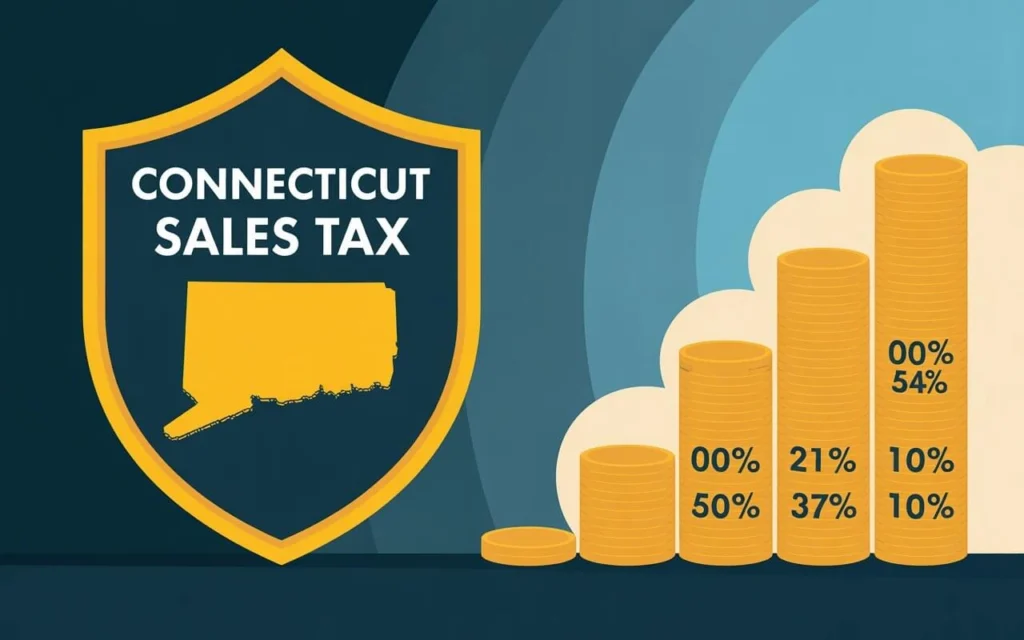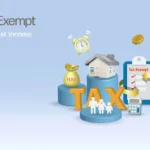If you’re wondering how Connecticut sales tax works, you’re not alone. Whether you’re a resident, online shopper, or small business owner, understanding how this tax is applied can help you make better financial decisions and avoid costly mistakes.
In this updated guide, we cover Connecticut sales tax rates, exemptions, use tax rules, filing requirements, and frequently asked questions — all in one place.

Content
What Is Connecticut Sales Tax?
The Connecticut sales tax is a consumption-based tax imposed on the sale of goods and certain services. It’s collected at the point of sale and remitted to the Connecticut Department of Revenue Services.
Unlike many other states, Connecticut does not impose local sales taxes — meaning whether you shop in Bridgeport or Hartford, the rate is the same.
Connecticut Sales Tax Rate
The Connecticut sales tax rate structure includes:
- 6.35% for most tangible personal property and taxable services.
- 7.75% for luxury goods exceeding $1,000, including:
- High-end clothing and accessoriesMotor vehicles
- Jewelry and watches
- 1% for specific goods and services like:
- Digital downloads (eBooks, movies, software)
- Meals sold in grocery stores for immediate consumption
This flat rate simplifies compliance for both consumers and retailers.
What’s Subject to Connecticut Sales Tax?
Understanding what is and isn’t taxable under Connecticut sales tax law is essential for shoppers and business operators alike.
Taxable Items
- Furniture and home goods
- Electronics and appliances
- Certain repair or installation services
- Motor vehicles
- Clothing over $1,000
Non-Taxable Items
- Prescription medications
- Clothing under $50 (some exceptions apply)
- Child car seats
- Most medical devices
Connecticut Sales Tax Exemptions
Connecticut offers specific sales tax exemptions for various individuals and organizations. Common exemption categories include:
- Nonprofit organizations with a valid exemption certificate
- Resale exemptions for items purchased to be resold
- Manufacturers purchasing equipment used in production
- Agricultural exemptions for qualifying farm-related purchases
To claim an exemption, eligible buyers must submit Form CERT-119, CERT-113, or the appropriate documentation to the seller.
How Does Connecticut Use Tax Work?
If you buy a taxable item out-of-state or online and the seller does not collect Connecticut sales tax, you are responsible for reporting and paying use tax.
This includes:
- Out-of-state purchases shipped to Connecticut
- Internet purchases from out-of-state sellers
- Tax-free shopping in other states where the item is later used in CT
The use tax rate mirrors the sales tax rate (6.35%), ensuring tax neutrality between in-state and out-of-state purchases.
Who Must Collect and File Connecticut Sales Tax?
Any person or business engaged in selling taxable goods or services in Connecticut — even if only occasionally — must register for a Connecticut Sales and Use Tax Permit.
Requirements:
- Register with the DRS before making any sales.
- Collect sales tax at the applicable rate.
- File and remit returns on a monthly, quarterly, or annual basis (depending on sales volume).
Ecommerce sellers and remote businesses may trigger economic nexus if:
- They exceed $100,000 in gross sales, and
- Complete 200 or more transactions within Connecticut in a 12-month period.
How to File Connecticut Sales Tax
Retailers and service providers are required to file Connecticut sales tax returns electronically through the myconneCT portal.
Filing Steps:
- Log in to your myconneCT account.
- Enter your sales data by category.
- Calculate total tax collected.
- Submit and pay electronically.
Tip: Filing frequency is determined by your business’s annual sales. The DRS will assign you a monthly, quarterly, or annual filing schedule.
Connecticut Sales Tax for Remote Sellers
With the rise of ecommerce, Connecticut sales tax rules have expanded to include remote sellers and marketplace facilitators.
If you’re a business selling into CT without a physical presence, you may still be required to:
- Collect and remit Connecticut sales tax
- Track sales thresholds and transaction counts
- Comply with CT-specific invoicing and documentation requirements
Marketplace facilitators (e.g., Amazon, Etsy) must collect sales tax on behalf of their third-party sellers and report it to the DRS.
Final Thoughts
Whether you’re running a business or shopping online, understanding Connecticut sales tax can protect you from fines, fees, and confusion. With no local tax add-ons, the state offers a streamlined approach — but you still need to pay attention to exemptions, use tax rules, and filing deadlines.
By staying compliant and informed, you can avoid surprises and ensure you’re meeting all CT tax obligations the right way.
FAQs
What is the current Connecticut sales tax rate?
The current Connecticut sales tax rate is 6.35% for most items, with higher rates on luxury goods and lower rates for select digital products.
Are groceries subject to sales tax in Connecticut?
No, most grocery items are exempt from Connecticut sales tax, though prepared foods and certain beverages may still be taxed.

A business blog writer at the age of 19, Francis is a jack-of-all trades when it comes to writing. He specializes in content creation for businesses and blogs. With years of experience under his belt, he’s able to provide both written and video content that will engage readers and viewers alike!



